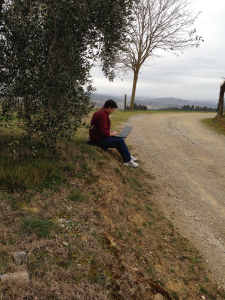What is the Role Of A Beta Reader?
It’s that time again!
 Now I gotta find BETA READERS?
Now I gotta find BETA READERS?
If I do my job properly as a writer, I have put together what in my head is a relatively cohesive, interesting story.*
That’s it. In a nutshell, that’s my job.
(If you’d like to be a Beta Reader for Poggibonsi, you can read two sample chapters HERE)
The role of a BETA READER is to read the finished manuscript (book, story, whatever) before it is released to the general public and give the author feedback.
That’s it.
The Beta can do as much or as little as they want, or as much or as little as the author asks.
Pretty blurry job description, isn’t it?
Yep.
Let’s go back to me and my job as a writer for a sec. Occasionally, I am wrong about the whole “cohesive story” thing. Sometimes we writers just write…
View original post 908 more words

11 replies on “What’s The Role of a BETA READER?”
It seems like people have a wide range of things they think beta reading is. What if, just hypothetically (not really), someone gives you a novel to beta read and in your opinion it’s nowhere close to being ready to be released to the public? As in, major plot holes, major character problems, events that don’t make logical sense, serious writing errors, you name it. Basically, they said beta read but they handed you an alpha read (is that a term? it should be). Maybe they think it’s much better than you think it is, or maybe they’re expecting a deeper level of critique. I’m curious about how other people would deal with this situation.
LikeLiked by 1 person
If I don’t know them very well, I probably don’t reply, hope they don’t follow up, and then if they do I say oh I haven’t gotten to it, and then if they follow up again I tell them I am not having time for the book I’m not going to be able to read it.
If they are someone I know and they value my input, I tell them the truth. That’s what they want and that’s what I want – but there’s a manner in which to do that.
I was recently given a book trailer to look at and I said it was probably not the person’s best work of the other trailers they have done, and that one or two were absolutely perfect in what they were trying to accomplish and this one fell very far short of that. Because I know this person, I went on to make suggestions. I went through frame by frame and told them exactly what I liked and didn’t like and then I offered suggestions for them to change it including the music and graphics. This is never easy for someone to hear but they admitted they didn’t love it either. So if they want the honest feedback, they have to get it.
When I wrote what I thought was a really great story, I gave it to a few trusted critique partners. Some of them thought it was fine and some of them explained that it wasn’t ready and then showed me what I needed to fix to improve it. The ones who told me the truth and showed me how to fix it, they were the ones who are interested in helping me become successful as an author, not people who were just trying to placate me – and send me on my way to fail. The hardest thing was to hear that the story lack to tension – it was supposed to be a suspense thriller! But I was going to hear that feedback from Amazon reviews, wasn’t I? And I would much rather hear it before I publish than after. If no one alerts me to what I’m doing wrong, I am going to keep making the same mistakes over and over. That’s not good for my career as an author at any level.
So I set it aside and I learned how to write tension. I hit the ball out of the park on my next attempt, a story that is filled with tension, and I learned how to use that tool. Then I went back and revised the first story and made it much much much much better.
So that’s what I do. If people want the honest truth for me, they get it. But I try to do it in a constructive manner, while pointing out the things that are good and emphasizing what they are doing right, and then suggesting options and explaining things.
If I were the person who gave you the manuscript, hopefully I gave it to a few others. Some people I gave it to will not understand the voice or the jokes or whatever; some will. Who is my intended audience? If nine out of 10 people get the joke and you don’t, I’m going to disregard your input on that joke! If nine out of 10 people don’t get the joke, I need to rewrite the joke!
LikeLiked by 1 person
I agree that honesty is the best policy if you think there are problems with the work, and that yes, you need to be constructive and positive too. And ideally, the person receiving the criticism would take it as it was intended — to help them improve certain parts of their story — and would benefit from the criticism in the long run. I’m just feeling burned because twice now, I spent a good deal of time and effort giving thorough comments on someone’s novel in progress, only to have my feedback be completely ignored. My regular critique partners say they really value my feedback, and I’ve had much better experiences with other beta reads, so I’m pretty sure it’s not that I was totally off-base. I wish there was a non-offensive way to ask a writer, before giving the feedback, if they’re really serious about making changes to their draft based on my feedback or if all they’re willing to listen to is “this is the best ever, don’t change a thing.” In one case, I later learned that the writer only scheduled one week to make any revisions that might arise from all the beta reads before sending it to the printer, which shows they never intended to make any substantial changes, no matter what the beta readers said. So in the future, I’m definitely going to ask ahead of time about the person’s revision schedule.
LikeLiked by 1 person
I guess that’s a learn as you go type of thing. I’ve given very detailed information to a very good friend who in my opinion ignored most of it. That book went on to do very well, so what we conclude is their target audience was not necessarily me. It doesn’t mean my input was wrong, but it means it may not have been precise for that particular story’s audience.
LikeLiked by 1 person
I’m glad to know I’m not the only one. And yes, live and learn. I won’t be volunteering so much of my time so readily in the future. In this case I would have sworn I was the target audience, but apparently not. Regardless, I wish the book well. It will be hard for me to tell how well it does, though. Since most folks I know say they won’t give less than a 5-star review to a fellow writer, I no longer trust those (few) stellar Amazon ratings. I can already tell that I won’t be able to give it 5 stars, but I don’t want to ding an indie writer who’s doing their best, so I won’t publish a rating for it… which makes me wonder how many other people feel the same.
LikeLiked by 1 person
Well that’s the other part of that coin, isn’t it? If I gave somebody a lot of input and they didn’t use it and then they asked me to review the book, I email them and tell them this is the kind of review it’s going to get. Then they can decide whether or not they want me to publish a three star or two star or whatever. Usually that’s not the case. I work mostly with really good writers whose work I love and I can’t wait to gush about it.
LikeLiked by 1 person
I mostly work with great writers too (well, relatively speaking) but I also have a soft spot for trying to help where I think it might be more useful. Too many years teaching, I think. 😉
LikeLiked by 1 person
Beta Readers are invaluable to me as an author! I am so grateful to them!
LikeLiked by 1 person
I one hundred percent agree!
LikeLike
[…] of whoever liked your page, as in not just your high school buddies but also people who were beta readers or critique partners or people from your mailing list. Direct those people to like your Facebook […]
LikeLike
[…] All month I’ve been positing sample chapters from the other authors; now YOU can read my full book as a beta reader! […]
LikeLike